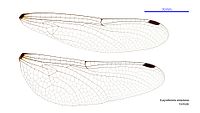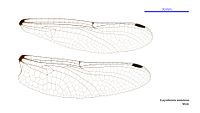Eusynthemis rentziana

| Swift tigertail | |
|---|---|
| Scientific classification | |
| Domain: | Eukaryota |
| Kingdom: | Animalia |
| Phylum: | Arthropoda |
| Class: | Insecta |
| Order: | Odonata |
| Infraorder: | Anisoptera |
| Family: | Synthemistidae |
| Genus: | Eusynthemis |
| Species: | E. rentziana |
| Binomial name | |
| Eusynthemis rentziana Theischinger, 1998[2] | |
 | |
Eusynthemis rentziana is a species of dragonfly of the family Synthemistidae,[3][4] known as the swift tigertail.[5] It is a slender, medium-sized dragonfly with black and yellow markings.[5][6] It inhabits streams in eastern Australia[7]
Eusynthemis rentziana appears similar to Eusynthemis guttata which is found in streams of south-eastern Australia.[5]
Gallery
[edit]- Female wings
- Male wings
See also
[edit]References
[edit]- ^ Dow, R.A. (2019). "Eusynthemis rentziana". IUCN Red List of Threatened Species. 2019: e.T87539229A87540189. doi:10.2305/IUCN.UK.2019-2.RLTS.T87539229A87540189.en. Retrieved 13 September 2024.
- ^ Theischinger, G. (1998). "The Eusynthemis guttata (Selys) group of species from Australia (Odonata, Synthemistidae) - Part 2" (PDF). Linzer Biologische Beiträge. 30 (1): 147–153 [148] – via ZOBODAT.
- ^ "Species Eusynthemis rentziana Theischinger, 1998". Australian Faunal Directory. Australian Biological Resources Study. 2012. Retrieved 5 March 2017.
- ^ Schorr, Martin; Paulson, Dennis. "World Odonata List". Slater Museum of Natural History. University of Puget Sound. Retrieved 5 March 2017.
- ^ a b c Theischinger, Günther; Hawking, John (2006). The Complete Field Guide to Dragonflies of Australia. Collingwood, Victoria, Australia: CSIRO Publishing. p. 212. ISBN 978-0-64309-073-6.
- ^ Watson, J.A.L.; Theischinger, G.; Abbey, H.M. (1991). The Australian Dragonflies: A Guide to the Identification, Distributions and Habitats of Australian Odonata. Melbourne: CSIRO. p. 278. ISBN 0643051368.
- ^ Theischinger, Gunther; Endersby, Ian (2009). Identification Guide to the Australian Odonata (PDF). Department of Environment, Climate Change and Water NSW. p. 214. ISBN 978-1-74232-475-3.


